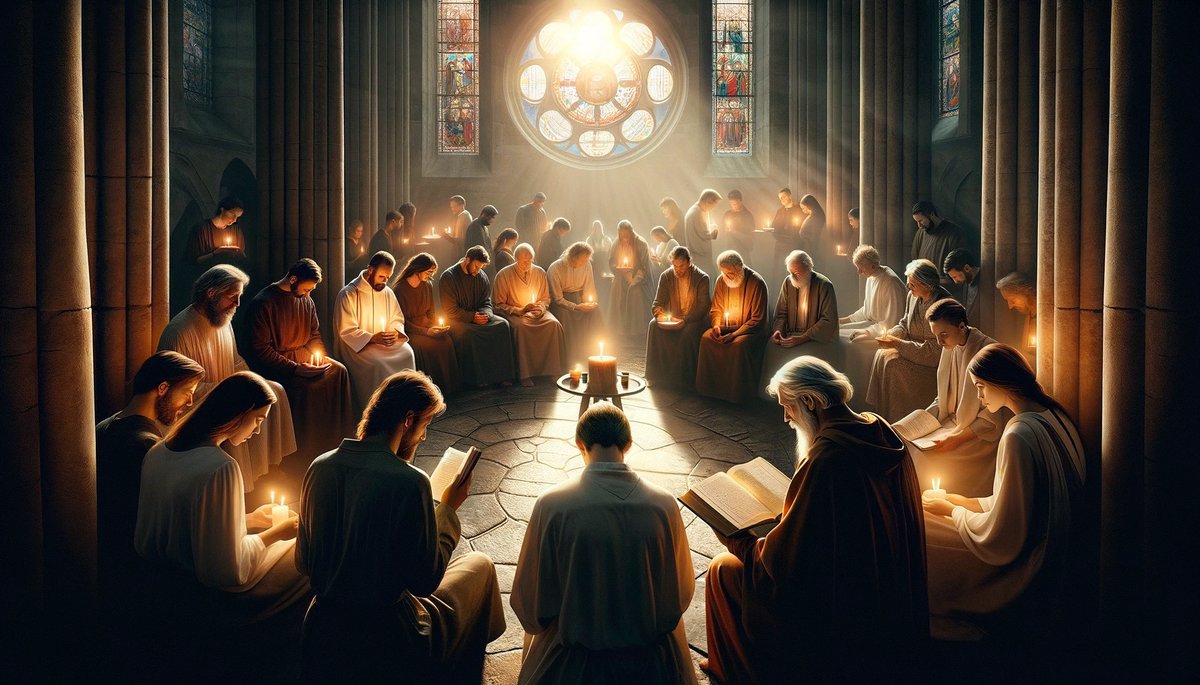Home>Special Themes>Why Don’t We Use The Word “Alleluia” In Lent?


Special Themes
Why Don’t We Use The Word “Alleluia” In Lent?
Published: February 27, 2024
Ericka Andersen, an editor at Christian.net, expertly merges digital strategy with content creation, focusing on faith and societal issues. Her communication skills enhance the platform's engaging narratives, fostering meaningful dialogue on belief's impact on society.
Discover the significance of not using the word "Alleluia" during Lent and explore the special themes associated with this practice. Uncover the reasons behind this tradition and its spiritual significance.
(Many of the links in this article redirect to a specific reviewed product. Your purchase of these products through affiliate links helps to generate commission for Christian.net, at no extra cost. Learn more)
Table of Contents
The Origins of "Alleluia"
-
Hebrew Roots: The word "Alleluia" has its origins in Hebrew, specifically in the phrase "Hallelu Yah," which means "Praise the Lord." This phrase can be found in the Hebrew Bible, particularly in the Psalms, where it is used as an exhortation to praise God.
-
Early Christian Adoption: The early Christian Church adopted the term "Alleluia" as a joyful expression of praise and worship. It became an integral part of Christian liturgical practices, especially in the context of celebrating the resurrection of Jesus Christ.
-
Liturgical Chant: Over time, "Alleluia" became associated with liturgical chant and was often sung during religious services as a way to exalt and glorify God. Its use was particularly prominent in the celebration of the Eucharist and other sacred rituals.
-
Global Influence: As Christianity spread throughout the world, the use of "Alleluia" transcended cultural and linguistic boundaries, becoming a universal expression of joy and praise in Christian worship.
-
Symbol of Easter Joy: In many Christian traditions, "Alleluia" is closely linked to the celebration of Easter, symbolizing the triumph of Christ over sin and death. Its joyful and exuberant nature reflects the hope and renewal brought about by the resurrection.
-
Continued Significance: Today, "Alleluia" remains a central element of Christian worship, serving as a powerful declaration of praise and thanksgiving in various denominations and liturgical settings. Its rich history and profound meaning continue to resonate with believers around the world.
Read more: Why We Do Lent
The Meaning of "Alleluia" in Christian Worship
-
Expression of Praise: "Alleluia" serves as a resounding expression of praise and adoration in Christian worship. It encapsulates the joy and gratitude of believers as they lift their voices in exultation of God's greatness and faithfulness.
-
Acknowledgment of God's Sovereignty: When Christians proclaim "Alleluia," they affirm God's sovereignty and majesty. It is a declaration of reverence for the Almighty, recognizing His supreme authority over all creation.
-
Celebration of Salvation: Within the context of Christian worship, "Alleluia" is a celebratory proclamation of the salvation and redemption offered through Jesus Christ. It signifies the victory of Christ over sin and death, bringing hope and deliverance to humanity.
-
Expression of Joy and Thanksgiving: The utterance of "Alleluia" reflects the overflowing joy and thanksgiving that permeate the hearts of believers. It is a jubilant declaration of gratitude for God's blessings and the assurance of His unfailing love.
-
Anticipation of Eternal Glory: In the Christian faith, "Alleluia" also conveys the anticipation of eternal glory in the presence of God. It points to the believers' hope in the promise of everlasting life and the fulfillment of God's redemptive plan.
-
Invocation of the Holy Spirit: When "Alleluia" is sung or spoken in worship, it is often accompanied by a sense of invoking the presence and power of the Holy Spirit. It creates an atmosphere of spiritual fervor and expectancy, inviting the Spirit to move among the congregation.
-
Unity in Worship: "Alleluia" unites believers in a shared expression of praise and worship. It transcends denominational differences and cultural diversity, serving as a unifying anthem that brings together the faithful in a harmonious chorus of exaltation.
-
Eternal Proclamation: The use of "Alleluia" in Christian worship extends beyond temporal circumstances, echoing the eternal praise offered by heavenly beings in the presence of God. It symbolizes the timeless exaltation of the divine, both in the earthly realm and in the heavenly realm.
-
Affirmation of Faith: Ultimately, "Alleluia" serves as an affirmation of faith, affirming the core beliefs of Christianity and reinforcing the central tenets of the Christian message. It encapsulates the essence of Christian worship, embodying the profound spiritual connection between God and His people.
Lenten Practices and the Absence of "Alleluia"
During the season of Lent, a noticeable absence of the word "Alleluia" is observed in many Christian worship services. This intentional omission is deeply rooted in the liturgical practices and spiritual significance of Lent. The following factors contribute to the absence of "Alleluia" during this solemn period:
-
Penitential Atmosphere: Lent is a time of repentance, self-examination, and spiritual discipline. The omission of "Alleluia" serves to create a somber and reflective atmosphere within the worship context. By refraining from the exuberant proclamation of "Alleluia," believers are reminded of the need for introspection and contrition as they journey through the Lenten season.
-
Fasting and Abstinence: Lent is often associated with fasting and abstaining from certain luxuries or indulgences. The absence of "Alleluia" aligns with the spirit of self-denial and sacrifice that characterizes this period of preparation for Easter. It underscores the solemnity of the Lenten observance and encourages believers to embrace a spirit of humility and moderation.
-
Focus on Suffering and Redemption: The omission of "Alleluia" during Lent directs attention to the suffering and sacrifice of Christ. It underscores the profound significance of Jesus' journey to the cross and the redemptive purpose of His crucifixion. By temporarily setting aside the joyful exclamation of "Alleluia," believers are invited to contemplate the depth of Christ's sacrifice and the transformative power of His resurrection.
-
Anticipation of Easter Joy: The absence of "Alleluia" during Lent also serves to heighten the anticipation of Easter joy. By temporarily withholding this expression of jubilation, believers are reminded of the forthcoming celebration of Christ's triumph over death. The intentional absence of "Alleluia" during Lent accentuates the contrast between the solemnity of the Lenten season and the exultant joy of Easter.
-
Liturgical Symbolism: The omission of "Alleluia" in Lent is a deliberate act of liturgical symbolism. It marks a distinct transition in the worship experience, signaling a shift from the celebratory tone of ordinary time to the introspective and penitential character of Lent. This intentional alteration in liturgical language serves to underscore the unique spiritual emphasis of the Lenten journey.
-
Spiritual Preparation: The absence of "Alleluia" during Lent underscores the period of spiritual preparation and purification. It prompts believers to engage in prayer, repentance, and acts of mercy, preparing their hearts to fully embrace the redemptive significance of Easter. The intentional absence of "Alleluia" serves as a catalyst for spiritual introspection and renewal during the Lenten season.
The absence of "Alleluia" during Lent is a deliberate and meaningful aspect of Christian worship, underscoring the unique spiritual emphasis of this season and inviting believers to engage in a profound journey of faith and reflection.
Historical and Theological Reasons for Omitting "Alleluia" in Lent
-
Early Christian Tradition: The practice of omitting "Alleluia" during Lent has deep historical roots within the early Christian tradition. As early as the 5th century, historical records indicate the intentional exclusion of "Alleluia" from the liturgy during the Lenten season. This ancient custom reflects the enduring significance of Lent as a period of spiritual preparation and penitential reflection leading up to Easter.
-
Theological Emphasis on Contrition: The theological rationale for omitting "Alleluia" in Lent is closely tied to the emphasis on contrition and repentance during this sacred season. Lent invites believers to engage in a profound examination of conscience, acknowledging their need for God's mercy and forgiveness. The absence of "Alleluia" serves as a poignant reminder of the call to genuine repentance and the recognition of human frailty in the face of divine grace.
-
Symbolism of Mourning and Sorrow: The omission of "Alleluia" in Lent carries symbolic significance, representing a period of spiritual mourning and sorrow for sin. By refraining from the joyful exclamation of "Alleluia," believers enter into a season of solemn reflection, acknowledging the brokenness of the human condition and the need for spiritual renewal. This intentional omission underscores the gravity of Lent as a time for lamentation and spiritual introspection.
-
Preparation for the Joy of Easter: The absence of "Alleluia" in Lent also serves to heighten the anticipation of Easter joy. By temporarily setting aside this exuberant expression of praise, believers are invited to journey through the Lenten season with a sense of longing and expectation for the forthcoming celebration of Christ's resurrection. The intentional omission of "Alleluia" creates a spiritual contrast, underscoring the transformative power of Easter in light of the penitential season of Lent.
-
Liturgical Symbolism of Transition: Within the context of Christian liturgical practice, the omission of "Alleluia" in Lent signifies a symbolic transition from ordinary time to the distinct spiritual emphasis of the Lenten period. This deliberate alteration in the liturgical language serves as a visible marker of the unique character of Lent, guiding believers into a season of spiritual introspection, prayer, and preparation for the joyous culmination of Easter.
-
Historical Continuity and Reverence: The historical continuity of omitting "Alleluia" in Lent reflects a sense of reverence for the sacred rhythms of the liturgical calendar. This longstanding tradition connects contemporary believers with the rich tapestry of Christian worship across centuries, underscoring the enduring spiritual significance of Lent as a time of self-examination, repentance, and anticipation of the redemptive hope found in the resurrection of Christ.
The historical and theological reasons for omitting "Alleluia" in Lent are deeply intertwined with the foundational principles of Christian faith, emphasizing the themes of contrition, spiritual preparation, and the anticipation of Easter joy within the sacred context of the Lenten season.
The Reintroduction of "Alleluia" in Easter Celebrations
-
Resurrection Triumph: The reintroduction of "Alleluia" in Easter celebrations marks the triumphant culmination of the Lenten journey. As believers transition from the solemnity of Lent to the exuberant joy of Easter, the resounding proclamation of "Alleluia" resonates with the profound significance of Christ's resurrection. It symbolizes the victory of life over death, hope over despair, and joy over sorrow, encapsulating the transformative power of the Easter message.
-
Euphoric Praise: The reintroduction of "Alleluia" in Easter celebrations ignites a spirit of euphoric praise and thanksgiving among the faithful. The jubilant exclamation of "Alleluia" reverberates through congregations, lifting hearts and voices in unison as believers exalt in the redemptive triumph of Christ. It becomes a resounding anthem of exultation, expressing the overwhelming joy of experiencing the resurrection and the promise of new life in Christ.
-
Easter Proclamation: The reintroduction of "Alleluia" in Easter celebrations serves as a powerful proclamation of the central message of the Christian faith. It declares the fulfillment of God's promise, the defeat of sin and death, and the hope of salvation through the risen Christ. The resounding chorus of "Alleluia" becomes a testament to the enduring truth of the Easter narrative, resonating with believers as they embrace the transformative impact of Christ's resurrection.
-
Renewed Hallelujah: The reintroduction of "Alleluia" in Easter celebrations represents a renewed outpouring of hallelujahs from the hearts of believers. It signifies a spiritual awakening and renewal, as the joyous refrain of "Alleluia" echoes the profound transformation brought about by the redemptive work of Christ. The reintroduction of "Alleluia" becomes a catalyst for spiritual revival, inspiring believers to embrace the fullness of God's grace and the promise of eternal life.
-
Eternal Hope: The reintroduction of "Alleluia" in Easter celebrations encapsulates the eternal hope and assurance found in the resurrection of Jesus Christ. It becomes a timeless expression of faith, transcending temporal circumstances and pointing to the everlasting victory of Christ over sin and death. The resounding "Alleluia" becomes a declaration of unshakable hope, inspiring believers to live in the light of Christ's triumph and the promise of a glorious future.
-
Continuity of Worship: The reintroduction of "Alleluia" in Easter celebrations reflects the continuity of worship within the Christian tradition. It connects contemporary believers with the enduring legacy of Easter joy, underscoring the timeless significance of the resurrection in the life of the Church. The resounding return of "Alleluia" serves as a link to the rich tapestry of Christian worship, uniting believers across generations in the exultant celebration of Christ's victory.
The reintroduction of "Alleluia" in Easter celebrations encapsulates the essence of the Christian faith, embodying the transformative power of the resurrection and inspiring believers to embrace the unbounded joy and hope found in the risen Christ.















